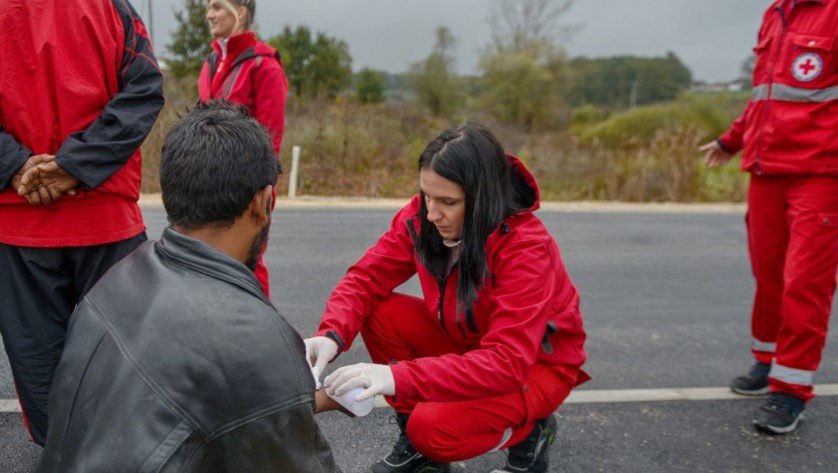Un atterrissage en douceur
Pour des volontaires comme Sami Rahikainen, il est crucial d’établir une relation de confiance avec les migrants qui arrivent dans un nouvel endroit à la recherche d’une toute nouvelle vie. Voici son histoire.
This booklet uses personal stories and case studies to explain what the Fundamental Principles are and how they apply in today’s world. Imagine you’re a volunteer driving an ambulance in a country going through civil war. What do you do when a soldier refuses to let you through a checkpoint because your patient is from an opposition-controlled area? Or you’re delivering aid after a catastrophic flood. Who do you help first? These questions are common for aid workers around the world. To help answer them, the International Red Cross and Red Crescent Movement makes use of its seven Fundamental Principles — humanity, impartiality, neutrality, independence, voluntary service, unity and universality.
Available in Arabic, Chinese, English, French, Portuguese and Spanish
This report draws on the voices and perspectives of almost 600 volunteer managers, delegates and volunteers from the International Red Cross and Red Crescent Movement, as well as external experts in 158 countries, to explore the challenges of promoting and supporting volunteering in the context of significant local and global change.
Available in English
Urbanization is constantly on the rise, with cities already absorbing more than half of the world’s population and armed conflicts increasingly being fought in urban settings. Regions facing protracted armed conflict see a steady decline in essential public services, while the relief–rehabilitation–development paradigm and funding mechanisms fail to provide a satisfactory response in these settings. Based on more than 30 years of ICRC experience in protracted armed conflict in urban settings, this report underlines the challenges, describes the characteristics and complexity of essential services, questions current paradigms and proposes new avenues to be explored to better respond to the needs of urban communities increasingly affected by these phenomena.
Available in English
Although it is increasingly recognized that gender-based violence (GBV) is a major feature of many conflicts, its occurrence during disasters is not as well understood. This study, commissioned by the IFRC, is designed to foster that discussion within both the Red Cross Red Crescent Movement and the larger humanitarian community.
Full report available in English; executive summary in Arabic, French, Russian and Spanish
The Global Road Safety Partnership, a hosted project of the IFRC, has released an essential new web-based resource to support advocacy efforts for improved road safety policies and implementation of programmes. This new online Advocacy Resource Centre is a one-stop resource for civil society organizations, National Societies and individuals campaigning for road safety policies or policy implementation. Content has been gathered from 43 countries, including the work of many National Societies, and will continue to be built upon throughout 2016, with a key focus on low- and middle-income countries, who share the largest burden of fatalities and injuries resulting from road crashes.
Available in English
www.grsproadsafety.org/advocacy

À l’heure où les migrations sont perçues de plus en plus comme une question de sécurité plutôt que comme un impératif humanitaire, les migrants, mais aussi les personnes qui tentent de les aider, sont considérés comme des criminels.